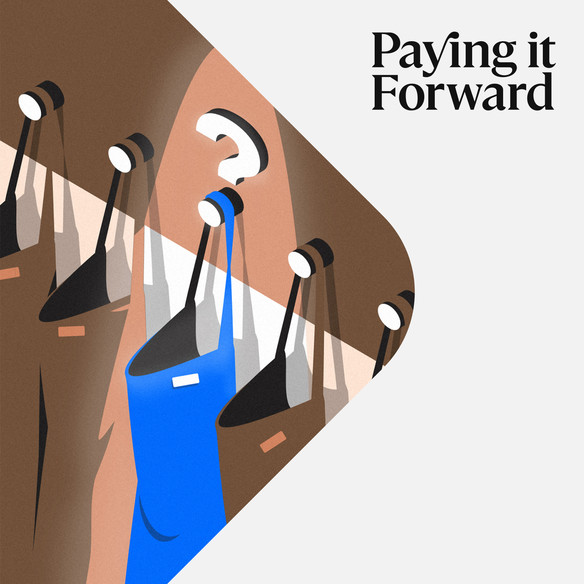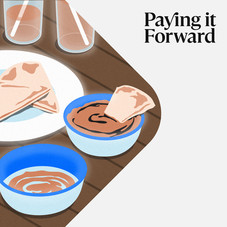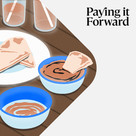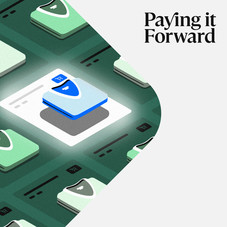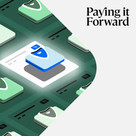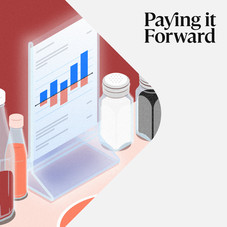Table of contents
When Firebrand Breads founder Matt Kreutz started his business, he didn’t know how to “have employees.” Two years in he hired his first employee, a driver. By his eighth year, his bakery grew to 26 employees. “We’re investing in our people and all the things that come with that and that means that we take a hit on the bottom line,” says Kreutz. “But it means that we have a 98% retention rate.”
One of the focuses for his mission-driven bakery is prioritizing hiring employees with high barriers to employment and providing a livable wage with the hopes this can be their only job. In order to provide an equitable wage, as well as health coverage, it has been a balancing act to scale quickly while making sure his employees are taken care of.
Payroll is the first step of scaling a team, which is why Ellen Cornish of Bench Accounting advises small business owners to explore online payroll providers. “There are so many reputable, inexpensive, and easy-to-use options that will help you stay compliant and on top of your payroll taxes. This is a very complex part of being a small business owner and hiring employees.” She adds that having a bit more structure can help avoid common payroll tax-related mistakes down the road.
A little bit about this episode on what payroll is and why it’s so important…
In our third episode of Paying it Forward, hear accounting expert Ellen Cornish detail the crucial information small business owners need to keep in mind when it comes to managing payroll and payroll taxes. You’ll then hear from Oakland-based business owner Matt Kreutz who grew his business from no employees to just under 100 in a few years. As his business grew, he had to learn the systems required to manage his employees’ needs at scale.
When it comes to running a small business, tackling financial decisions can be daunting and often overwhelming. Each week, we’ll focus on a common financial issue bringing in an expert in the field with actionable insights and a fellow business owner who has tackled it first hand.
Guests
- Matt Kreutz, founder and CEO of Firebrand Artisan Breads, an artisan bread company in Oakland, California
- Ellen Cornish, Lead Client Associate of Bench Accounting, a professional bookkeeping service for US-based small businesses located in Vancouver, Canada
More resources
- Read: The Five Payroll Basics Every Employer Should Know
- Read: Payroll Software: How to Choose What’s Best for Your Business
- Try: Downloadable Payroll Tax Calendar for Small Business Owners
- Try: Square’s Employer Launchpad
- Try: Learn how Square Can Simplify Employee Benefits for Your Small Business
Square offers full-service payroll that’s integrated with all your tools. Pay W-2 employees and 1099 contractors with unlimited pay runs per month. Square automatically handles all your federal, state, and local payroll tax filings so you can focus on running your business
Full transcript:
You’re listening to Paying it Forward, a Square Podcast. When it comes to running a small business, tackling financial decisions can be daunting and often overwhelming. Each week we tackle one issue that could affect your business’ cash flow and hear from a fellow business owner experiencing it first hand.
You might even be so worried of mismanaging taxes or misclassifying employees that you think taking on staff isn’t quite worth the leap. What are the deadlines and forms crucial to know in order to best operate your business and do right by your employees?
Ellen: Payroll taxes are taxes that are withheld from employee wages. Employers are required by law to deduct payroll taxes from the wages of every employee, as well as contribute taxes on behalf of their employees. Payroll taxes covers a lot of different taxes that we just simply call payroll tax, but there’s actually so much that goes into it.
That’s Ellen Cornish, lead client research associate at Bench Accounting, a professional bookkeeping service for small businesses. She says that payroll taxes encompasses a large range of taxes.
Ellen: It includes federal income taxes, state and local income taxes, federal and state unemployment taxes, as well as Social Security and Medicare taxes. It sounds like a lot, but that’s really what goes into just the broad statement of payroll tax.
The main difference between payroll taxes and other taxes is really in what they fund. Payroll taxes contribute towards Social Security, Medicare, workers’ compensation, and unemployment programs. When you are running a business and you are responsible for remitting payroll taxes, there are dates throughout the year.
There are different authorities to pay taxes to. There are different various forms to file. It gets very complex, very fast, and there is not a clear-cut answer in the same way that there is for personal taxes.
For general forms, there are a couple main ones that every employer should be aware of. The first one is Form 941. This is one that employers must submit to the IRS every quarter to report the amount of income, Social Security, and Medicare taxes that are withheld from pay. Form W-2 is a combined wage and tax statement you provide to your employees once a year. Another form is Form W-4 that an employee will submit showing their filing status and any relevant exemptions if they have any.
Payroll taxes can change depending on the state and type of employee. She advises being on the lookout for some of these common mistakes.
Ellen: When you’re a brand new business owner, or you’re just starting out on payroll, these are some of the mistakes you’ll probably make at the very beginning and then learn from. The first one is reporting an employee as an independent contractor. This is a really big one, and it can get very expensive if the IRS determines that an independent contractor was actually an employee. If this happens to you in your business, you as an employer are on the hook for all of those payroll taxes.
The next mistake that we so often see is mixing up exempt and non-exempt employees. The reason this is relevant is because overtime wages are owed to non-exempt employees. They are not owed to exempt employees. So that distinction is actually very important. Another one is miscalculating overtime pay. This one is really common because the rules of overtime pay vary from state to state and even city to city.
Another big one is miscalculating taxable income.For example, if you are paying out vacation pay or overtime hours to an employee, payroll taxes still have to be calculated and remitted on that. Another mistake is missing the tax deadline itself. And again, these vary on the state and federal level. Paying the wrong tax rates. You might be surprised to hear it, maybe not, but tax rates are actually reassessed every single year. And if you pay the wrong rate, you’re liable for any of the missing tax, as well as interest and fines. It’s really important for this one to pay the right tax rate at the very beginning. And then the last one that we have is paying the wrong state taxes. You should be paying state taxes for the state that your employee is living in, not where your business is located.
If you’re just starting out on payroll, she says using a payroll provider can make all the difference.
Ellen: There are so many reputable, expensive, and easy-to-use options out there that will help you stay compliant and on top of your payroll taxes. This is a very complex part of being a small business owner and hiring employees. And just know that this feeling of not being sure if you’re doing it correctly, or you don’t know how you’re doing it right, this is a really common feeling. If you’re feeling like this, just know you’re not alone.
Our guest today is Matt Kreutz, founder and CEO of Firebrand Breads in Oakland, California. The company started as a wholesale business serving customers like Whole Foods and Blue Bottle. Today, Firebrand employs just under a hundred employees, many of which are formerly incarcerated or homeless. The future for their business and their employees starts with social responsibility.
Matt: I’ve been baking since I was 14. My whole life. I’ve never done anything else. For work, I’ve always been very fortunate to have fallen into a bakery job and just fell in love with it from the get go. I’ve always worked in bakeries for the past 25 years. I started Firebrand in 2008. We are a mission-driven bakery. We focus on hiring people who are formerly homeless or formerly incarcerated or otherwise have high barriers to employment.
And we focus on providing a just, equitable workplace, shared value, and thriving communities through the craft of baking. We do breads and pastries wholesale, and we have a retail cafe here in Downtown Oakland. We deliver bread and pastries all the way currently from San Rafael down to just above Santa Cruz.
Putting employees first and staying true to the mission has always been a part of the 10-year plan for Firebrand, but doing what’s right for their business and staff has its challenges.
Matt: For years and years and years, we’ve always wanted to be an employer that can be the one job for you. We’ve always been every year trying to do a little bit more and seeing how we could get that to be the case. The cost of living in the Bay Area doesn’t help. Part of that living wage initiative was also we started covering 100% of health, dental, and vision care for the employees as well this year. So that’s taken some burden off employees as well.
But we’re trying to just slowly get to this point where Firebrand can be the one job that you have.
We take a hit. We took a big hit, but I mean, I think we’ve communicated that to our funders and our investors. They understand that we’re not going to be a high-margin, high-cash business. We’re always going to be a low-margin business because we’re always trying to reinvest with our staff and we’re always trying to do new initiatives and put new things in place. We have to make sure that we run a fairly tight ship and try to do the best we can with that because our labor costs are always going to be crazy.
We’re in the people business. We always say that we’re in the people business and that means we’re investing in our staff, we’re investing in our people, and all the things that come with that. That means that we take a hit on the bottom line, but it means that we have a 98% retention rate. Our average person at Firebrand has been there for more than three years. I think we have like three people out of almost 70 who have been here less than a year.
Five employees grew to 10, 20, and soon 50. But as the company grew quickly, Matt found that the bakery needed more structure.
Matt: I didn’t know how to have employees. Took us like two and a half years to get our first employee. He was a driver. I think we had four employees after like four or five years. By year eight, we had like 26 employees. I was still baking every day full time. I still hadn’t had a day off in eight years. We moved into Downtown Oakland and we went from 26 people to 52 people in like two weeks. It was a total mess. I was working at like a mom and pop. You got six employees, maybe 10, it’s like, ‘whoa, employees,’ to having almost 70 now and 85 before.And then we’re going to be hiring soon to get over a hundred. We’ll be over a hundred by probably the end of the year.If I could tell any business owner anything and I could tell my former self something, when you get to 20, you need to find somebody. You need to have somebody in-house or externally or somebody to handle your HR.
Employees opened up the need for a more formal payroll system. And with that, a system for payroll taxes as well.
Matt: I know how to bake bread. That’s literally it. I have no other job skills. I know how to bake bread. That’s what I do. There’s no backup plan. This is kind of it.
When we first started, my ex-wife was a bookkeeper, and so she was doing the books. I was baking the bread. That was like kind of the setup for the first three years. And then she left. And so I had no bookkeeper and our computer got stolen out of the bakery by someone who came in with a door unlocked in the middle of the night, while I was in the front of the bakery.
I didn’t realize it, and they stole our desktop. We had nothing backed up. She had nothing backed up. It was a mess. And then she left, and then I had no bookkeeper and I officially had no books. I had to figure it out. I hired somebody named Gemma Holmes who came in and she helped rebuild our books while I was learning how to use Excel and learning how to use payroll and learning how to do payroll and how to use our systems that I’d never used. She hadn’t been paying payroll taxes. We owed a ton to the IRS. It was just a mess that was uncovered.
We were like having people write their schedules, their hours on a calendar that was posted on the wall. And then it was like, ‘okay, let’s get a punch card. Okay, let’s get time sheets.’ Everything was kind of just like one thing in front of another.
Firebrand is like a very slow moving boat in a way for a lot of things. It just goes forward, like we’re going forward, but it’s one step at a time. That’s kind of what it was with accounting.
Part of learning about accounting in this case meant finding a way to get payroll taxes under control.
Matt: We were like the Mr. Magoo of bakeries like forever, which is probably an outdated reference for sure, but just like running around blind. We didn’t know what we were doing. We were like, “Hey…” We weren’t even paying our bills. It was like a lifestyle business. I don’t mean that pejoratively, but it was just like money in, money out. We’re definitely barely making a living. We’re surviving. We so didn’t know any better. We had no idea. I bake bread, so I’m not like a strategy master or like an operational wizard.
It’s just like, I know how to bake bread. I had to learn all these things. I just got a letter in the mail. It was like, “You owe $100,000,” and I was like, “Oh, this is crap.” And then I was like, “Oh, they keep coming. I think this is real.” I mean, I think as a business owner, people think of you and you think of yourself as this end all, be all thing. I think you’re not. We’re humans and we don’t know a lot of things, and I think that’s okay. You could look like an idiot. It’s fine.
Just find somebody who’s doing it better than you and ask them questions, but you have to or else you end up owing $100,000 to the IRS or just any other pitfalls. I feel like there’s this mindset that you need to be perfect, or you need to be amazing, or you need to be a certain way.
I had a CPA that we knew analyze our books and write a letter to the IRS saying that we were yes, a functional business that could actually stand on its own and could survive and then pay these taxes back. We weren’t some defunct money pit. I had him write that letter, send it to the IRS. We went to Downtown Oakland, sat in with an IRS agent, and we talked about a payment plan. We came about the payment plan. That’s how we “solved” that issue.
For business owners just starting out, Matt says the key to his business has been navigating the art of hiring from the very start.
Matt: I think look for fit, man. What do you want from a person? What do we want out of this person? And then that way you’re not trying to fit a person into a position. It’s more of a natural thing. We use an open hiring model. That’s pioneered by the people at Greyston Bakery for the past 35, 40 years. It’s simple. If you want a job at Firebrand, you come in, you put your name on a clipboard, and you sign up. You put your name, you put your phone number, and we contact you when we have a job. We don’t take resumes.
We don’t do formal job interviews. We don’t call references. We don’t do background checks. We don’t do cover letters or any of that stuff. For us, it’s a working interview, and it’s really a team-focused interview. We’ve gone through stages at Firebrand where you’ve got all of these like super top gun amazing bakers and it’s just like cats in a bag. No one gets along. It’s just a mess. It’s all these alpha people who just fight with each other all the time, and it ended up being just a total nightmare.
We’re not looking for those kind of like, ‘oh, I’ve been at Hackney for 20 years or 30 years. It’s cool. It’s great.’ But it’s like, are you nice? Do you have a good attitude? Do you ask questions? Are you respectful? Do you say hello? Do you interact with your co-workers?
We want everybody here to be a good person first and fit in first, because things like baking and customer service, we could train that. I could train you how to bake. I can’t train you how to be a nice person. For us, that’s what we look for honestly. I mean, I could confidently say about 90% or higher of our employees had no baking experience whatsoever. That’s not very important to me. It’s really just about your attitude.
Thank you to Ellen Cornish and Matt Kreutz For their thoughts on payroll. Ellen Cornish is lead client research associate for Bench, America’s largest professional bookkeeping service for small businesses. Matt Kreutz is founder and CEO of Firebrand Bread. Check them out on firebrandbread.com or head over to 2343 Broadway. Grab a pastry, cup of coffee, and say hello.
For more information on the tools like the ones we discussed on today’s episode, head to squareup.com/townsquare. Download free templates for profit and loss statements, cashflow forecasting, and more.
You’ve been listening to Paying it Forward, a Square production. This episode was produced by Deborah Findling, Camille Kail, and Clara Shannon. Our music was composed by Jordain Wallace, with sound recording by Sorrentino Media and D.R. Baker. Thanks for listening.
This podcast is for educational purposes and does not constitute, legal, financial or tax advice. For specific advice applicable to your business, please contact a professional. All loans are issued by Square Financial Services Inc, a Utah chartered industrial bank, member FDIC, located in Salt Lake City, Utah. A minimum payment of 1-18th of the initial loan balance is required every 60 days and full loan repayment is required within 18 months. Actual fee depends upon payment card processing history, loan amount, and other eligibility factors.
Loan eligibility is not guaranteed. All loans are subject to credit approval. Square Inc is a financial services company, not a bank. Banking services are provided by Square’s banking affiliates, Square Financial Services Inc, or Sutton Bank, members FDIC.
![]()

